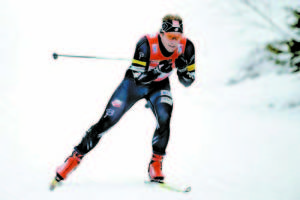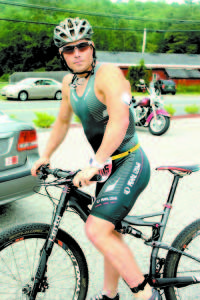Olympian in the Great Adventure Challenge mix
By Wayne E. Rivet
Staff Writer
Kris Freeman could easily have given up on his dream.
When he was 19, Kris had just walked away from a full scholarship at the University of Vermont to pursue Olympic cross-country skiing. A routine blood test (by the Olympic ski team prior to the 2002 Olympics in Salt Lake City) revealed twice the normal level of glucose, and Kris was diagnosed with Type 1 diabetes.
“Doctors insisted that my Olympic dream was over because no one with Type 1 diabetes had ever competed in an Olympic endurance sport,†Kris remembered.
Kris was “terrified†because he knew nothing about the disease.
“Things you don’t understand are always the scariest. The more I learned, the more comfortable I became with it. The hardest part was believing I could go to the Olympics…continue to follow my dream,†he said. “I went home and did some research. The thing that really made me think I could do it was all of the innovative technology that was available, like Dexcom’s continuous glucose monitoring system.â€
Two years later, Kris made it to the Olympics. He has been competing at a high level for 15 years, which shows that not only can one compete in endurance sports with a chronic disease, but one can also do it for a very long time.

The Freeman File
Age: 35
Height: 5’11’’
Weight: 175
Hometown: Andover, N.H.
College: Spent a year skiing for the University of Vermont before joining the U.S. cross country residence program in Park City in 2000.Racing: Despite managing his illness as a Type 1 diabetic, for over a decade Kris has posted the best U.S. cross-country distance results since the Bill Koch era of the early 1980s, and continues to lead as the veteran of the U.S. Ski Team.
Olympics: 2002, 2006, 2010
World Championships: Competed in 2001, 2003, 2005, 2007, 2009, 2011. Fourth twice, just missing medal in 2003, 2009. Nine Top 10 finishes.
Battle against diabetes: Since spring 2008, Kris has worn an innovative tubeless insulin pump called the OmniPod that adheres to his skin and delivers insulin so he does not have to inject it. He is sponsored by and is a spokesman for Eli Lilly and Company, the manufacturer of the rapid-acting insulin Humalog.
Quote: “A little bit of adversity isn’t a bad thing…There’s no reason that this disease has to stop you.â€
The four-time Olympian and winner of 17 national championships never stops training, competing and striving for more. In June, Kris placed 12th at the Mount Washington Road Race in his home state of New Hampshire. This Saturday, he will put his athletic skills and endurance to the test at The Great Adventure Challenge triathlon at Shawnee Peak.
The Great Adventure Challenge, which starts at 9 a.m., includes a 2.5-mile paddle on Moose Pond followed by a 16.5-plus mile mountain biking segment concluding with a 2-mile trek to the summit of Pleasant Mountain and back down to the hill. Competitors can go solo or as a member of a team.
Kris will be on his own.
The News was able to interview Kris via e-mail this week.
BN: When did you first start to cross-country ski; what do you like most about the sport, and how did you cope with the rigors of the sport while also living with diabetes?
Kris: I was skiing before I could walk. It’s tough to balance caring for diabetes and getting ready for a race — the release of stress hormones makes controlling blood sugar even harder. I’ve managed by having a specific pre-race routine. I have to stay relaxed through meditation and by eating a very specific diet.
BN: What were the keys to winning at the highest levels, nationally and competing in the Olympics?
Kris: Continuous glucose monitoring has been critical. Anaerobic exercise can make blood sugar rise, and so can adrenaline. It’s essential to monitor. For example, in a race, I have to make sure I have enough sugar to sprint at the end.
(Note: At the Olympics in Vancouver, Kris was with the lead group, but developed low blood sugar levels. He fell in the snow. He called into the crowd that he needed sugar. Someone gave him a 20-ounce bottle of Powerade. Although hope of a medal was gone, it never occurred to Kris not to get back up and finish. Fans saw him finish. “It’s important to believe you can do what you want to do,†he said.)
BN: What is the message you try to relate to others who battle diabetes?
Kris: I have visited over 150 summer camps to inspire children with diabetes to pursue their dreams. There are so many misconceptions about the disease, and I want to show them that it does not have to be a limiting factor. Overall, attitudes have changed a lot. Most people these days think less about, “woe is me†and more along the lines of, “anything is possible.†I hope to inspire individuals. I talk to them about what they can do, which is anything in my opinion.
BN: Have you ever competed in the Great Adventure Challenge?
Kris: I have never competed in this specific event. I wanted to do the triathlon to give myself a challenge in the off-season. I plan to set a record as an individual. I expect the biggest challenge will be the run. To prepare, I have done a lot of core strengthening work to improve my balance on the rough terrain, especially on the downhill run.
Â



